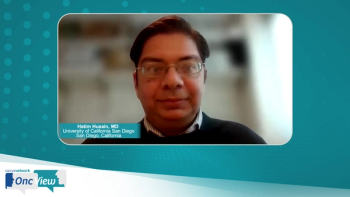
Future Directions in Advanced Endometrial Carcinoma
Closing the discussion on advanced endometrial carcinoma, Dr David O’Malley shares his perspective on the future treatment landscape.
Episodes in this series

Transcript:
David M. O’Malley, MD: Now the question becomes, can we replace chemotherapy with immunotherapy? There are 3 ongoing trials, which are asking the question of immunotherapy vs chemotherapy. We have both with a single agent, checkpoint inhibitor and combination lenvatinib-[pembrolizumab], in LEAPS-001 [NCT03884101]. So when we look at these patients, the question becomes, how much is chemotherapy adding? The challenge is [that] each of those trials that are ongoing do not have a chemotherapy plus immunotherapy arm.
I would not omit chemotherapy at this time, outside the clinical trial. What are some of the challenges moving forward in other molecular subtyping? Well, for one, establish it across the world. Our European colleagues have done a much better job of us in the molecular subtyping of uterine cancer. We need to do it at our sites in the United States and across the world, to make sure we know the molecular subtype, because we’ve also completed trials in patients just with local regional disease.
There are many exciting trials, many of which I’ve referenced, which I cannot wait to see the results of. When we look at what we call GOG-3053 or B21 [NCT04634877], which is looking at [pembrolizumab] with localized regional disease…. This is a phase 3 trial with [pembrolizumab], where they took patients with local regional disease, meaning lymph nodes are involved; all patients get chemotherapy, physician choice on radiation, which is very controversial, and then [pembrolizumab] vs placebo. This trial has completed enrollment, and we’re hoping to see the results in the next few years.
What we saw at SGO [the 2023 Society of Gynecologic Oncology Annual Meeting] with advanced metastatic recurrent uterine cancer is…almost unprecedented. We haven’t seen this in [gynecologic] cancers since SOLO-1 [NCT01844986]. As of today, I think we need to…consider [having a] conversation with our patients. [Does] immunotherapy in all patients who are recurrent metastatic need to be incorporated? To me, it’s a slam dunk with regard to patients with MMR [mismatch repair] deficiency or MSI [microsatellite instability] high. Proficient patients—with the data right now, it sure does look very convincing. The challenges are, what do we do next? Do we use lenvatinib-[pembrolizumab] after previous IO [immunotherapy] in a proficient patient? We look at that in a deficient patient. Obviously, there’s no data. What we saw [at SGO 2023] is so important for our patients. We are curing patients with recurrent metastatic cancer. It’s so important that we become comfortable with these agents that we keep our clinical suspicion of IO-associated toxicities high to make sure we identify them early on and intervene appropriately, so that we make sure that they can continue on therapy or receive benefit from these wonderful agents.
Transcript edited for clarity.
Newsletter
Stay up to date on recent advances in the multidisciplinary approach to cancer.





































